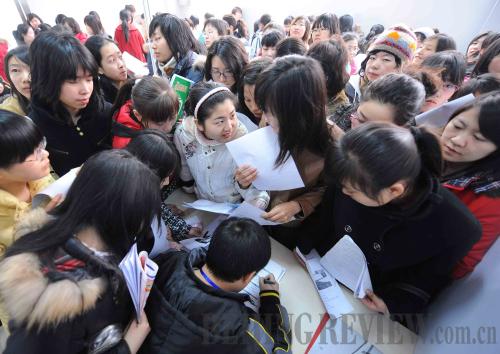|
 |
|
SPECIAL CARE: A Beijing job fair exclusively for female college graduates with 600 jobs on offer attracts 5,000 applicants on March 4, 2009 (LUO XIAOGUANG) |
The year 2009 saw unprecedented media coverage of many issues central to women's rights. Attention was focused on several social problems commonly afflicting women—employment discrimination, domestic violence and sexual violence. The China Women's News was at the forefront of covering the issues most concerning women. The year's highlights follow:
Human trafficking
Public security agencies nationwide are achieving success in a campaign launched in April 2009 to crack down on abductions and trafficking in women and children. Police reported that they had brought charges in 4,420 cases of trafficking in women and children as of October 28, broken up 982 criminal gangs, found 1,358 runaways and saved 2,169 abducted children and 3,851 women. Using DNA analysis, the police identified 298 of those who had been abducted.
In March 2009, 29 ministries and commissions released the China National Plan of Action on Combating Trafficking in Women and Children (2008-12).
The special campaign to crack down on human trafficking helps save children and women, and fosters a favorable social environment to teach more about the heinousness of the crime. But enforcement problems have also been exposed, such as a lack of funds, a shortage of police manpower and expertise and the imperfection of related regulations and laws.
China has established a long-term mechanism to deal with the issue, from prevention and enforcement to victim recovery. But since such crimes still happen in some places, the country should increase anti-human-trafficking awareness campaigns and set up more short-term shelters and settlements.
Workplace discrimination
In June 2009, the Law School of Peking University released a report on sex discrimination in the Chinese workplace.
The report showed 16 percent of female respondents who had attained degrees above the postgraduate level had been rejected for jobs though they scored better in placement tests than male applicants. Respectively, 4.1 percent and 3.4 percent of females were forced to sign contracts that included promises of not getting married or pregnant. Almost 22 percent said their workplaces did not want to recruit women who were of childbearing age.
The country has its Constitution, the Labor Contracting Law, the Employment Promotion Law and the Law on Protection of Rights and Interests of Women to ensure that both sexes enjoy equal rights of employment. The laws make clear the special protections afforded to women when they are of childbearing age, pregnant or caring for newborns. But cases of discrimination still exist due to the lack of enforcement and responsibility. The country ought to perfect the laws and regulations to give a clear definition concerning employment discrimination.
Political representation
Women have been taking part in higher numbers in villagers' committees. By the end of 2008, there were 507,272 female members, comprising 21.7 percent of all committees. There had been 58,891 female village committee directors, who represent 10.2 percent of the total. Rural females have more channels to participate in village governing bodies. The quality of the rural female cadre has also improved.
Given the political improvement, it's reported that there are still one sixth of villagers' committees that include no female members. With new amendments to the Organic Law of the Villagers' Committees, people may see clearer requirements concerning quotas for women in the governing bodies.
Domestic violence
In December 2009, domestic and foreign experts gathered in Nanjing, east China's Jiangsu Province, to come up with a list of opinions concerning a draft law by the All-China Women's Federation (ACWF) to prevent domestic violence. They suggested including marital rape as a form of domestic violence.
China's fight against domestic violence has made great progress, but still has gaps to fill compared to international standards. Things need to be improved: the definition of domestic violence is now too narrow and some judicial procedures do not protect victims' rights.
More than 60 countries have enacted laws against domestic violence. Between 2004 and 2008 in China, there were 40,000 to 50,000 cases of family violence reported annually, which comprised 10 percent of all complaints.
There are now 27 provinces, autonomous regions and municipalities that have enacted local regulations or policies to stop domestic violence. In July 2008, ACWF and six government ministries promulgated a document offering opinions on the prevention of and intervention in domestic violence.
Climate and gender
| 